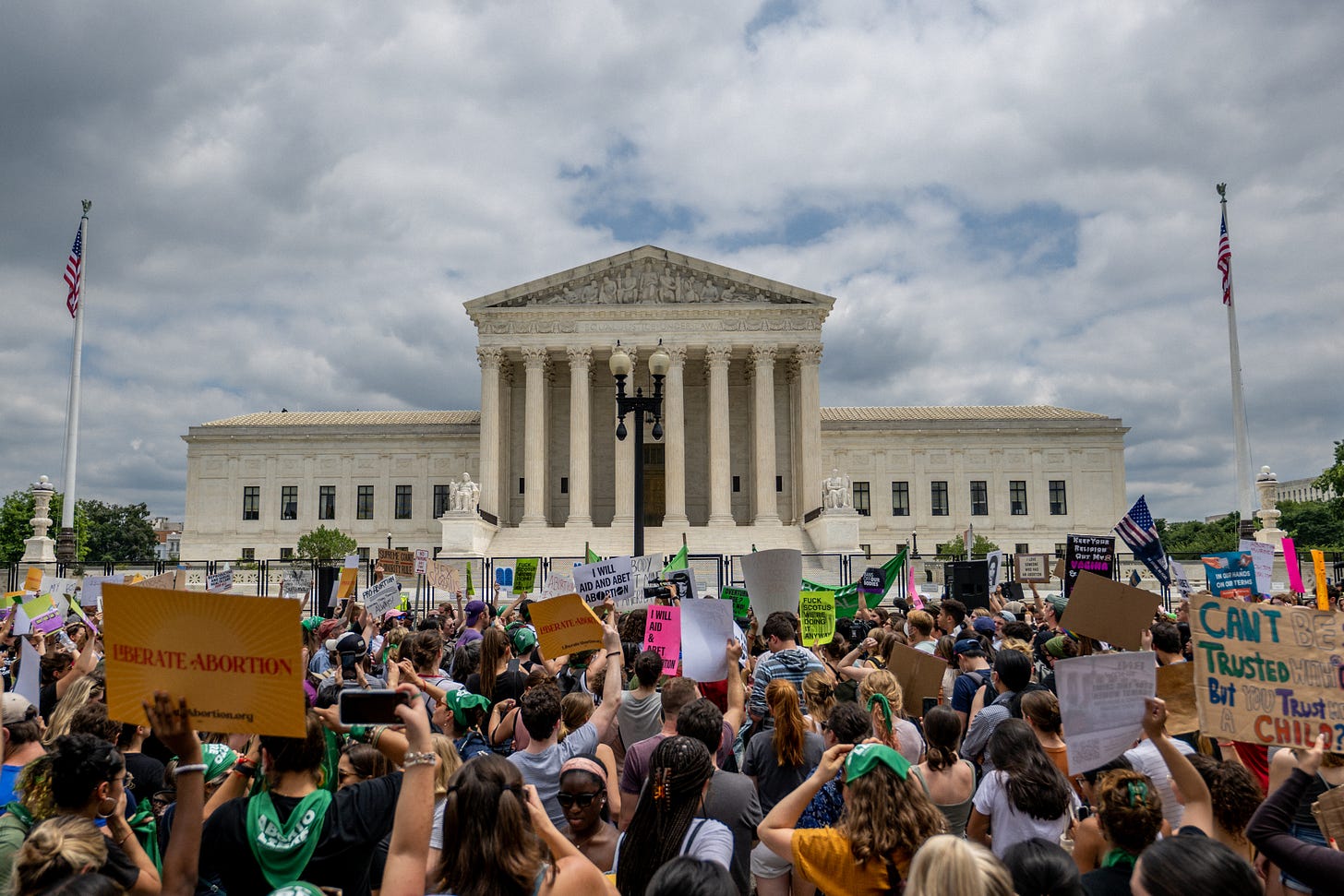Pro-Choice Trump-Voting Women Won’t Rescue Biden
Focus groups suggest that they care about the issue, just not enough to split with Trump.

IMAGINE CHATTING WITH FIFTEEN Trump-voting women in swing-state Pennsylvania who remain dismayed by the overturning of Roe v. Wade. How many of them would you guess are so upset about the Supreme Court’s Dobbs decision that it would drive them to vote for President Joe Biden in November?
Think about your guess for a moment.
Would you expect ten of them to flip because of Dobbs? Or five? How about: one.
Yes, just one. That was what we discovered during a pair of fascinating 90-minute focus groups on January 31 with women across the Keystone State—ten Republicans, three Democrats, and two independents—who voted for Trump in 2020.
Democrats have been cautiously optimistic that abortion would be the issue that swings the election Biden’s way. Buttressing their hopefulness are the results in the five states that held direct votes on abortion rights since Dobbs was decided—including the red states of Kansas, Kentucky, and Ohio. Voters supported those rights every time.
Judging from what we heard in our two sessions, however, that optimism should be tempered.
First, if the election were held tomorrow, in a hypothetical five-way race, twelve of our focus group participants said they would stick with Trump, two would support Robert Kennedy Jr., and one would flip to Biden. (None would take Cornel West or Jill Stein.) Of the fifteen respondents, two said they are seriously considering not voting at all—one who’d prefer Trump and one who would support Kennedy.
Most would stick with Trump for the same reasons they chose him initially—they want a businessman whom they believe knows how to run our economy and is tough on immigration. They want someone who projects strength, unlike Biden whom they describe as “incompetent,” “mindless,” “sleepy,” “slow,” and “old.”
But what’s interesting is that on abortion, these women sound like Biden voters. Here’s why the Dobbs decision troubles them:
Susan, 76, from Pittsburgh, explained, “I was unhappy with the decision because I think we took a big step backward in treating women as not equal, not intelligent enough to make their own choices, able to be controlled by men and their thinking. [The decision is] just a giant step backward.”
“The idea that in some states you can’t even get [an abortion], or most people don’t know they’re pregnant at six weeks—that’s terrifying to me,” remarked Amy, 41, from Collegeville.
“I would never have an abortion, but I think people should have a right to make their own choice,” commented Mary Beth, 69, from Springfield.
Olivia, 26, from Pittsburgh, added, “You don’t know their living situation at the moment, so they shouldn’t be forced to have kids.”
YET, DESPITE THEIR PROFOUND UNHAPPINESS with the Dobbs decision, these women say the issue of abortion is not nearly as resonant as the economy and immigration. They described how their views on abortion will affect their vote in November.
“[Preserving abortion rights] means nothing in the grand scheme of everything to me,” said Sarah, 35, from Cresco. “I’m going to vote for who I think is going to be the best for my family.”
“I’m a woman and I should have more of a say about it, but honestly it doesn’t matter that much to me, as it might matter to someone else,” said Stacey, 50, from Philadelphia.
Kathi, 62, from Shickshinny, said, “Unfortunately, it falls to like number five [on my priority list], like what I’m concerned about. It’s number five.”
Christine, 48, from Malvern, explained, “No one candidate is going to have policies that align with what I would like to see. . . . There are greater priorities [than abortion] that I would look at.”
Regarding the U.S. economy, fourteen of the participants described its current state as “lousy,” citing inflation, housing affordability, increasing homelessness, and our record national debt. Only three said that they’re better off now than they were four years ago—and two of those said they would vote for Trump, the other for Biden.
Another surprise from the group was that only three of the fifteen women said that former President Trump is even partially responsible for Roe v. Wade being overturned. There was barely any awareness that he nominated three Supreme Court justices who made overturning Roe a reality. In fact, there was a great deal of uncertainty among these respondents about where Trump even stands on abortion.
AS A FURTHER CHALLENGE for the Biden campaign, these women have little clue where Biden himself stands on abortion. When given a choice to label the president’s position on abortion by ideology, six said it’s liberal, three said it’s moderate, two said it’s conservative, and four didn’t know.
And then there’s this question: What abortion policy could these women live with? Thirteen of fifteen were fine with a national fifteen-week limit, with exceptions for rape, incest, and the physical health of the mother. But there’s a big proviso: While they are fine with fifteen weeks, that limit has to apply in all fifty states. They are not at all okay with individual states voting to impose limits of fewer than fifteen weeks. They explained that some of the tighter restrictions on abortion, such as the six-week bans in some states, were troubling to them because some women don’t know they are pregnant at that point.
Only one respondent was concerned that a second Trump presidency could lead to a national abortion ban and a limit they did not support, such as six weeks. The other fourteen were skeptical this could happen, with one stating it would be “political suicide.”
This raises an interesting question: What’s the greater act of political suicide: pushing for a six-week ban—or expecting that Trump-voting pro-choice women will rescue your standard-bearer in November?





